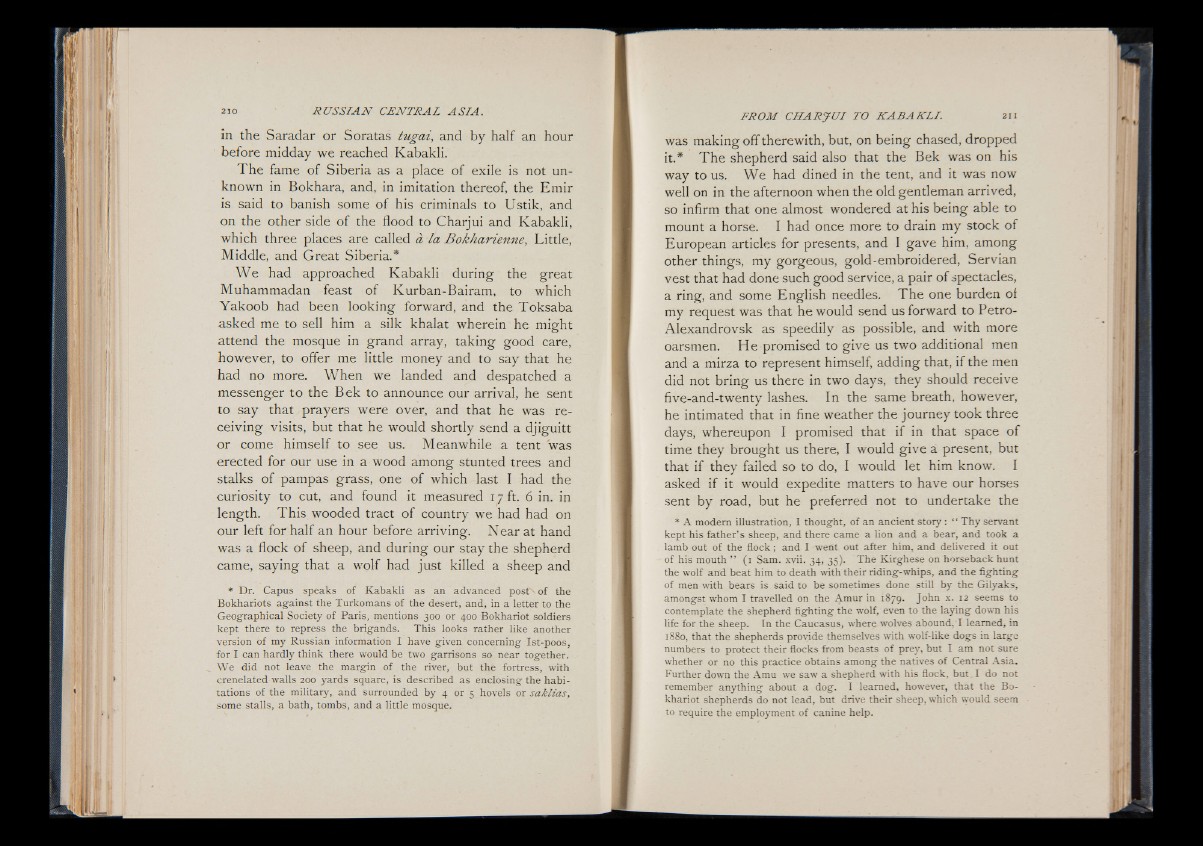
in the Saradar or Soratas tugai, and by half an hour
before midday we reached Kabakli.
The fame of Siberia as a place of exile is not unknown
in Bokhara, and, in imitation thereof, the Emir
is said to banish some of his criminals to Ustik, and
on the other side of the flood to Charjui and Kabakli,
which three places are called d la Bokharienne, Little,
Middle, and Great Siberia.*
W e had approached Kabakli during the great
Muhammadan feast of Kurban-Bairam, to which
Yakoob had been looking forward, and the Toksaba
asked me to sell him a silk khalat wherein he might
attend the mosque in grand array, taking good care,
however, to offer me little money and to say that he
had no more. When we landed and despatched a
messenger to the Bek to announce our arrival, he sent
to say that prayers were over, and that he was receiving
visits, but that he would shortly send a djiguitt
or come himself to see us. Meanwhile a tent was
erected for our use in a wood among stunted trees and
stalks of pampas grass, one of which last I had the
curiosity to cut, and found it measured 17 ft. 6 in. in
length. This wooded tract of country we had had on
our left for half an hour before arriving. N ear at hand
was a flock of sheep, and during our stay the shepherd
came, saying that a wolf had just killed a sheep and
* Dr. Capus speaks of Kabakli as an advanced poslNof the
Bokhariots against the Turkomans of the desert, and, in a letter to the
Geographical Society of Paris, mentions 300 or 400 Bokhariot soldiers
kept there to repress the brigands. This looks rather like another
version of my Russian information I have given concerning Ist-poos,
for I can hardly think there would be two garrisons so near together.
We did not leave the margin of the river, but the fortress, with
crenelated walls 200 yards square, is described as enclosing the habitations
of the military, and surrounded by 4 or 5 hovels or saklias,
some stalls, a bath, tombs, and a little mosque.
was making off therewith, but, on being chased, dropped
it.* The shepherd said also that the Bek was on his
way to us. We had dined in the tent, and it was now
well on in the afternoon when the old gentleman arrived,
so infirm that one almost wondered at his being able to
mount a horse. I had once more to drain my stock of
European articles for presents, and I gave him, among
other things, my gorgeous, gold-embroidered, Servian
vest that had done such good service, a pair of spectacles,
a ring, and some English needles. T he one burden of
my request was that he would send us forward to Petro-
Alexandrovsk as speedily as possible, and with more
oarsmen. He promised to give us two additional men
and a mirza to represent himself, adding that, if the men
did not bring us there in two days, they should receive
five-and-twenty lashes. In the same breath, however,
he intimated that in fine weather the journey took three
days, whereupon I promised that if in that space of
time they brought us there, I would give a present, but
that if they failed so to do, I would let him know. I
asked if it would expedite matters to have our horses
sent by road, but he preferred not to undertake the
* A modem illustration, I thought, of an ancient story: “ Thy servant
kept his father’ s sheep, and there came a lion and a bear, and took a
lamb out of the flock; and I went out after him, and delivered it out
of his mouth ” (1 Sam. xvii. 34, 35). The Kirghese on horseback hunt
the wolf and beat him to death with their riding-whips, and the fighting
of men with bears is said to be sometimes done still by the Gilyaks,
amongst whom I travelled on the Amur in 1879. John x. 12 seems to
contemplate the shepherd fighting the wolf, even to the laying down his
life for the sheep. In the Caucasus, where wolves abound, I learned, in
1880, that the shepherds provide themselves with wolf-like dogs in large
numbers to protect their flocks from beasts of prey, but I am not sure
whether or no this practice obtains among the natives of Central Asia.
Further down the Amu we saw a shepherd with his flock, but I do not
remember anything about a dog. I learned, however, that the Bokhariot
shepherds do not lead, but drive their sheep, which would seem
to require the employment of canine help.